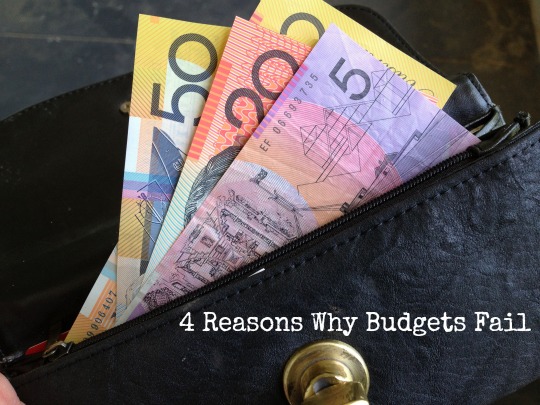This time two years ago, I had Mr I guest post on how we budget as a family and the tools we use. His post takes you through the three step process we use to set and then track a budget. Each step has its own corresponding spreadsheet which can be downloaded in one file or like us you can use a file in the cloud on Google Drive.
In the recent survey feedback, many of you noted that you would like more posts on budgeting and family finances, with a number of readers saying they have tried to budget but it doesn’t work for them.
So today I thought I would run through 4 of the common reasons why budgets fail:
1. Not tracking previous expenses
Looking at previous expenses gives you a better understanding of what you are likely to spend in the future. If you have decided you want to set a budget try and have at least a month, preferably a quarters worth of living expenses to analyse, so you have a full understanding of where your money is currently going.
Randomly setting budgets for your expenses can mean you are way off target. Once you start tracking your expenditure and see your financial position as being well over budget you often lose enthusiasm for the budget process and give up on it.
2. Not making realistic changes
People often come to budget setting due to a financial need. It may be to reduce debt or to start saving. It is a common to set a budget on what you want to achieve as an end result. This is fine if you can realistically make the changes you need to get there. Quite often though, the bottom line is more of a dream than a reality.
If you have actually looked at your previous expenses, but then just decide to cut them by 25% to achieve desired savings without first calculating a plan as to how you will do this, reduced spending is very unlikely to actually happen. As in scenario one, you may find yourself very quickly well over budget. Disheartened you are likely to decide the budget process doesn’t work for you and give up on it.
3. Not having a buffer
Even if you set your budget on the most realistic of expenses and track to it perfectly, it only takes one out of the ordinary event to throw your budget completely out of whack. If you don’t have a buffer or what is commonly know as an emergency fund, then you will find yourself in financial difficulty.
As a general rule, financial advisors (which I am not one!) recommend having at least three months personal expenses set aside in a savings or a highly liquid money market account. This will help you get through things like an unexpected job loss, need to replace a high value item like a fridge or an unexpected new addition to the family.
4. Not choosing a budget system that works for you
As noted earlier, we have a defined budget system, but the system we use may not be the one for you. We use credit cards for most of our purchases and always pay them off on time and have strategies around this for balancing cash flow. For some using credit cards is not part of the equation due to personal choice or other reasons.
Simple Mom was one of the first blogs I ever read and she does not use credit cards at all and uses an envelope system for budgeting (yes this is pretty much putting cash in envelopes). A system that while certainly not for me, seems to work for her family and many others. So you will actually use it and stick to it, it is essential you find a budget system that works for your family.
Have you tried setting a family budget before only to give up after a few months? What did you find most challenging about the process?

